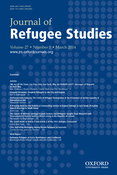-
Views
-
Cite
Cite
Karen Jacobsen, Maysa Ayoub, Alice Johnson, Sudanese Refugees in Cairo: Remittances and Livelihoods, Journal of Refugee Studies, Volume 27, Issue 1, March 2014, Pages 145–159, https://doi.org/10.1093/jrs/fet029
Close - Share Icon Share
Abstract
Many refugees become ‘stuck’ in the urban centres of transit countries, unable to move onward or to return home. This study explored the livelihoods of Sudanese refugees in Cairo, and the extent to which remittances supported them. We found that 89 per cent of our respondents were economically active, but their income seldom covered their rent plus subsistence. A quarter of our sample received remittances, but these are not a reliable source of income. An important coping strategy for refugees is borrowing, but this increases their vulnerability. We recommend that humanitarian programmes should focus on enabling refugees to minimize their debt and increase their income, by taking advantage of existing skills, or learning new ones.


